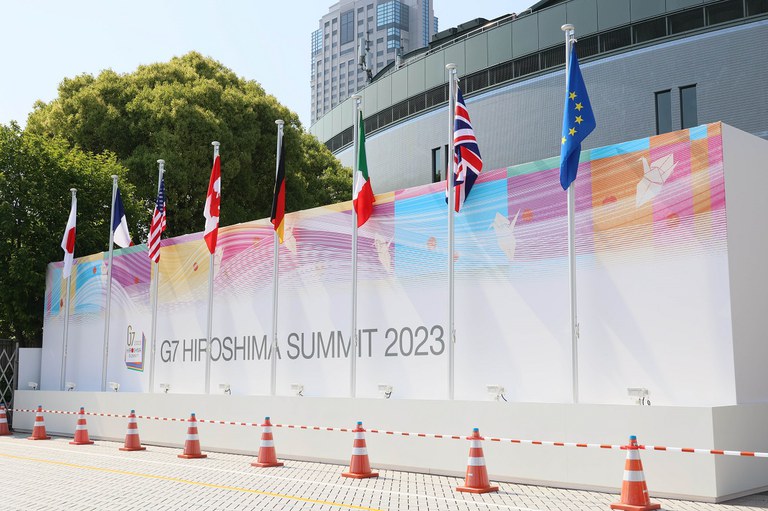Notícias
G7 SUMMIT
Speech by President Lula at the second G7 working session

"To break this vicious cycle, we need to tackle the third political challenge: leadership", said Lula - Credit: G7
When G7 was created, in 1975, the main global crisis revolved around oil. 48 years later, the world still has not managed to get rid of its dependency on fossil fuels.
Scientific evidence confirms that the current pace of emissions will lead us to an unprecedented climate crisis.
We are close to an irreversible tipping point.
Kyoto is not just a vibrant Japanese metropolis. It lends its name to a Protocol that has become a benchmark for the lack of collective action.
We are not acting quickly enough to contain the global temperature rise, as agreed in the Paris Agreement.
But this is a crisis that does not affect everyone in the same way, nor to the same degree, nor at the same pace.
More than 3 billion people are already directly affected by climate change, especially in low and middle-income countries. And, if we follow this path, that number will continue to increase.
We cannot bet on magical solutions.
Technology will be an essential ally, as long as there is broad access to it. So-called market approaches can help, but it is unrealistic to believe that they will solve the crisis.
The main problem is political. In my opinion, we have three major challenges ahead of us.
The first challenge concerns valuing the most legitimate and democratic spaces of global governance. In 1992, in Rio de Janeiro, we hosted the Summit that resulted in the three main conventions that guide our action: on climate, biodiversity and desertification.
These agreements were signed with extensive dialogue with civil society. We cannot allow these Conventions to be undermined.
The second has to do with the imbalance in the climate agenda. There is no doubt that we need to expand our efforts on mitigation, especially in countries that have historically emitted the most of greenhouse gases, but we cannot lose sight of the growing demand for adaptation and loss and damage.
That is why we insist that rich countries fulfill their pledge to allocate $100 billion a year to climate action. Other efforts will be welcome, but they do not replace what was agreed at the COP in Copenhagen.
We also need to think together about the ecological and fair transition, which includes green industrialization and green infrastructure, in order to generate decent jobs and fight poverty, hunger and inequality.
It is of no use that rich countries and regions make progress in implementing sophisticated transition plans, if the rest of the world is left behind or – worse – is harmed in the process.
Developing countries will continue to need funding, technology and technical support to transform their economies, fight climate change, preserve biodiversity and fight desertification.
To break this vicious cycle, we need to tackle the third political challenge: leadership. We must mobilize all parties in the common - but differentiated - effort to prevent an even more serious aggravation of climate change.
Brazil's credentials are solid. Our energy matrix is among one of the cleanest in the planet. Half of the energy consumed in my country is renewable. In the world, this figure is only 15%.
Eighty-seven percent of our electricity also comes from renewable sources, while the world average is twenty-eight percent.
With our potential in solar, wind, biomass, ethanol, biodiesel and green hydrogen energy, Brazil will be an exporter of sustainability by the end of my mandate.
We are aware that a protected Amazon is part of the solution. That is why we are hosting in August, in Belém, a Summit of Amazon countries. And that is also why Brazil had its candidacy to host COP30 on Climate approved by a unanimous decision by the Latin American and Caribbean Group.
We will remain open to international cooperation for the preservation of our biomes, whether in the form of investment or collaboration in scientific research.
The indigenous peoples and those residing in the Amazon region will be the protagonists of its preservation. The 50 million South Americans who live in the Amazon must be the number-one partners, agents and beneficiaries of an inclusive and sustainable development model.
Along with Indonesia, the Democratic Republic of Congo and other countries in Africa and Asia, we will act to defend the main tropical forests on the planet.
Brazil will be relentless in its fight against environmental crimes. We want to lead the process that will save the planet.
We will fulfill our commitments to zero deforestation by 2030 and achieve the goals voluntarily assumed in the Paris Agreement.
Thank you very much.